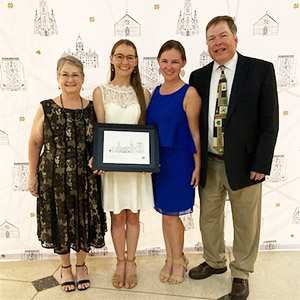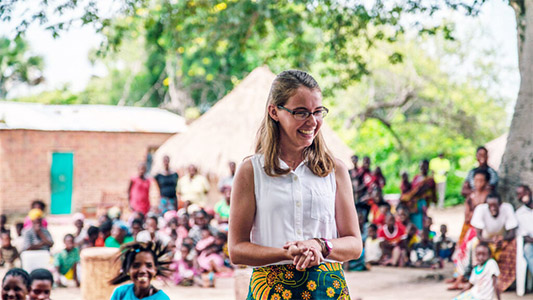Lizzie Heilmann (Zambia) awarded Domer Dozen

From left to right, Sue Heillmann, Lizzie Heilmann, Caroline Cipriani, sister of Lizzie and Dr Timothy Heilmann.
Lizzie Heilmann, daughter of Dr. Timothy and Sue Heilmann, graduate of Loyalsock Township High School and 2015 graduate of the University of Notre Dame has been award the “Domer Dozen” award for her work promoting better health care and prevention in Africa.
The Domer Dozen program, according to a news release, is the signature initiative of YoungND, the Alumni Association’s young alumni group. The 2023 honorees have displayed extraordinary dedication to the Alumni Association’s mission and have excelled in public service, health care, immigration, church life and entertainment, among other areas. Heilmann was chosen by a selection committee consisting of the YoungND board, university officials and Alumni Association staff, which considered 182 nominees this summer and evaluated them based on a weighted ranking system and their contributions in their respective fields.
“Taking to heart the call to serve those most in need across the world, Lizzie Heilmann ’15 has spent her early career promoting better access to public health services in African communities,” the news release said.
Heilmann studied drug resistance in malaria parasites as an undergraduate at Notre Dame, which inspired her to become an epidemiologist to more fully understand diseases and the communities in which they spread. While pursuing a master’s in public health at Emory University, she analyzed malaria data from a mass bed net campaign in Nigeria and tutored refugees in English. These formative experiences helped prepare Heilmann for a service stint with the Peace Corps as a health volunteer in Zambia.
Lizzie Heilmann, daughter of Dr. Timothy and Sue Heilmann, graduate of Loyalsock Township High School and 2015 graduate of the University of Notre Dame has been award the “Domer Dozen” award for her work promoting better health care and prevention in Africa.
The Domer Dozen program, according to a news release, is the signature initiative of YoungND, the Alumni Association’s young alumni group. The 2023 honorees have displayed extraordinary dedication to the Alumni Association’s mission and have excelled in public service, health care, immigration, church life and entertainment, among other areas. Heilmann was chosen by a selection committee consisting of the YoungND board, university officials and Alumni Association staff, which considered 182 nominees this summer and evaluated them based on a weighted ranking system and their contributions in their respective fields.
“Taking to heart the call to serve those most in need across the world, Lizzie Heilmann ’15 has spent her early career promoting better access to public health services in African communities,” the news release said.
Heilmann studied drug resistance in malaria parasites as an undergraduate at Notre Dame, which inspired her to become an epidemiologist to more fully understand diseases and the communities in which they spread. While pursuing a master’s in public health at Emory University, she analyzed malaria data from a mass bed net campaign in Nigeria and tutored refugees in English. These formative experiences helped prepare Heilmann for a service stint with the Peace Corps as a health volunteer in Zambia.
Soon after starting that project, COVID-19 emerged. Though Heilmann became one of thousands of Peace Corps volunteers evacuated from her country of service, this didn’t stop her from staying the course with health education and service, the news release said. During the evacuation and early waves of the pandemic, Heilmann shared emerging data with Zambian colleagues and fellow volunteers to dispel misinformation surrounding COVID-19. Though grateful to reconnect with family and friends during the pandemic, she was eager to return to Zambia, this time with the Public Health Institute and Centers for Disease Control and Prevention (CDC) Global Health Fellowship Program.
The honorees were invited back to the Notre Dame campus for a special recognition weekend. The Domer Dozen met with current students and university leaders, be celebrated during an awards dinner with the YoungND board and Alumni Association staff members were recognized in Notre Dame Stadium during the football game against Tennessee State University, according to the news release.

Lizzie Heilmann, a Peace Corps volunteer in Zambia who is improving the health and well-being of people in her community while creating lasting impressions for years to come.
Why did you join the Peace Corps?
My interest in joining the Peace Corps stemmed from my undergraduate research studying malaria parasites. Stimulated by that work, I went on to study parasitology, global health, and epidemiology. Tropical parasitic diseases, like malaria, were strangely fascinating to me and I wanted to study them more but with an opportunity to travel to the countries afflicted by them. With the Peace Corps, I couldn’t have found a better opportunity to learn about malaria and its impacts or to directly assist a community in their efforts to eliminate the disease.
Tell us about your role as a health worker.
Our health work with the Peace Corps in Zambia has two main goals: (1) to improve maternal and child health and (2) to mitigate the effects and spread of HIV. Volunteers are also encouraged to conduct malaria projects in our communities. To accomplish these goals, we assist at local health facilities, train community health volunteers, and conduct health education in our communities and schools. We work to clarify misconceptions about different diseases and break down stigma and discrimination surrounding HIV.
I am assigned to a health center that serves a community of 32 villages with 11,000 individuals – and I live in a small village of 75 households. Most days I’m either at the clinic or out in the community conducting health programs.
Every month, I work with members of the Neighborhood Health Committees to conduct “under fives” where we vaccinate babies and weigh all children under five. We monitor the growth of children and identify those who are underweight and malnourished. I counsel the mothers on feeding practices and invite them to nutrition talks and cooking demonstrations. This is perhaps the area where I have seen the most impact in my community. Before I arrived, children were seldom examined for malnutrition, and when a case was identified, the child was often wasting away and needed hospitalization. With regular monitoring, we can catch the underweight children earlier and help their mothers bring them back to a healthy weight.
Tell us about your language learning experience during your service.
Learning a new language was my biggest fear coming to Zambia. There are over 70 local languages here! Peace Corps volunteers undergo intense language training before being posted to our individual sites. For three months, we studied language four hours a day, six days a week. We learned in small groups and lived with homestay families near our training center for language immersion.
On my third day in Zambia, I was assigned to a Chichewa language group. I was blessed with a very patient and dedicated language instructor who guided me through all the vocabulary, verb tenses, and noun classes needed to string together a proper sentence. To my relief, I passed my exam, but the real language test came when I was posted at site. My new neighbors spoke quickly with words I couldn’t even pick apart from each other, let alone translate. Pushing aside my nerves and embarrassment, I kept trying and gradually improved my language skills. I can now comfortably converse with my neighbors and lead entire health talks in Chichewa!
What have you learned about yourself during your service? What have you learned about what it means to be an American?
During my service, I’ve learned a lot about myself. I moved into my first house and am living alone for the first time in my life. I’ve learned that I can live quite well without electricity and running water. I’ve learned to recognize my limitations and set realistic expectations for myself. Most importantly, I’ve learned a lot about patience. In Zambia, time doesn’t mean the same thing as it does in the US. There isn’t as much rush and urgency and showing up on time to an event isn’t as important as stopping to greet people along the way.
Being an American in Zambia comes with privileges and challenges, many of which stem from the common Zambian assumption that all Americans are wealthy. As Peace Corps Volunteers, we are ambassadors of the American people. While we as individuals may or may not fit the American stereotype, we may be the only Americans our communities have met. With that comes a responsibility to share the diverse races, cultures, and lifestyles of the American people. We take awkward or annoying encounters and transform them into learning moments for our communities.
In one conversation I had with a woman, she told me she envisioned houses in America as being filled with piles and piles of money. I explained to her that there are all levels of wealth and poverty in America and that many people my age are just struggling to pay off years of student loans.
What advice do you have for other Americans thinking about serving in the Peace Corps?
To anyone thinking about serving in the Peace Corps, just do it! There’s never really a perfect time to join the Peace Corps. If we all waited for a perfect time to serve, there wouldn’t be thousands of volunteers throughout the world right now.
Don’t be intimidated by the 27-month commitment. It seems like a long time, but volunteers are able to vacation home or have their families visit. Plus, once you start working, the two years don’t seem like nearly enough time to accomplish everything you set out to do. Before you know it, close of service is approaching and you’re asking to stay another year!
No comments yet.
Add your comment